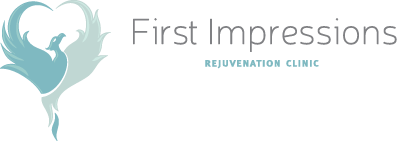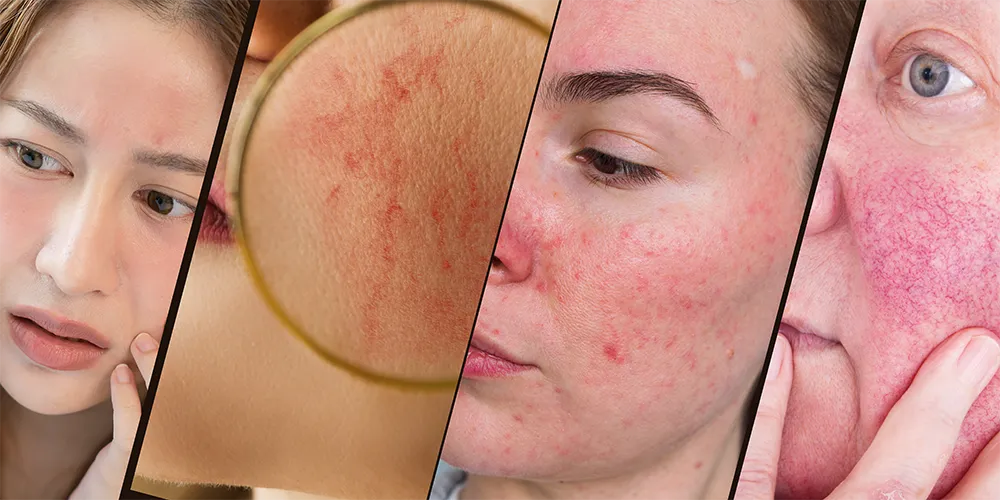Let’s wrap up Rosacea Awareness Month!
If you’ve been following our social media channels this month, you will have noticed our monthlong dedication to the skin condition, Rosacea. Skincare can be an overwhelming journey as it is, but when you suffer from a condition like Rosacea, looking for treatments can be even more confusing. Let’s wrap up all that great information we shared into one bundle!
What is rosacea?
Rosacea is a chronic skin condition that affects millions of people worldwide, causing redness, flushing, visible blood vessels, and sometimes acne-like bumps. While it can be challenging, you can effectively manage your symptoms and improve your quality of life.
It’s more common than many people realize, affecting an estimated 5-10% of the global population. It typically begins after the age of 30 and is more prevalent in fair-skinned individuals of Northern European descent. Women are more likely to develop rosacea than men, although men may experience more severe symptoms. Additionally, there is evidence to suggest a genetic predisposition to the condition, with a family history of rosacea increasing one’s risk.
What is the main cause?
While the exact cause of rosacea remains unknown, several factors are known to trigger or exacerbate symptoms. Sun exposure being one of the first. Now if you’ve visited either of our First Impressions clinics in Bedford or Sydney, then you probably have heard our incessant spiel on the daily use of Sunscreen! (Wear it every day, 365 days, spring, summer, fall, winter, in the daylight hours!!). UV radiation from the sun can further aggravate rosacea symptoms, leading to increased redness and flushing. Protecting the skin with sunscreen and seeking shade can help minimize sun-induced flare-ups. Physical sunscreens containing zinc oxide or titanium dioxide may be less irritating for individuals with rosacea.
What we eat can affect our skin in more ways than one, but consuming hot beverages, spicy foods, or alcohol can trigger flushing and exacerbate rosacea symptoms in some individuals. So, avoiding those trigger foods will help to reduce symptoms.
Exposure to extreme temperatures is also a trigger, whether hot or cold. This can provoke flushing and irritation in individuals with rosacea. Dressing appropriately for the weather and avoiding sudden temperature changes can help minimize symptoms.
We all know stress cannot be avoided, but emotional stress is a common trigger for rosacea flare-ups as well. Practicing stress-reduction techniques such as mindfulness, meditation, or deep breathing exercises may help manage symptoms.
Finally, certain skincare products containing artificial fragrances, alcohol, certain actives, or other irritants can exacerbate rosacea symptoms. Opting for gentle products formulated for sensitive skin can help minimize irritation. One of my favorite recommendations is the Calming Collection from AlumierMD. It has everything you need in one bag! Cleanser, Serum, Moisturizer and most importantly Sunscreen! All formulated for your sensitive skin. Identify and avoid triggers that worsen your rosacea symptoms, whether they are dietary, environmental, or lifestyle related. Keeping a journal can help you track and pinpoint your specific triggers and help you to avoid those triggers that wreak the most havoc for your sensitive skin.
How do you manage rosacea symptoms?
I wish I could tell you that Rosacea can be cured, but that would be a lie and I am here to help you, not lead you astray. But, with a little care and some help from experts, it can be effectively managed. Along with good, gentle skincare, and trigger avoidance, there are several treatments that can help. Consider a laser consultation with one of our skin specialists at either of our First Impressions clinics in Sydney or Bedford. BBL, or Broad Band Light can significantly reduce redness and alleviate broken blood vessels that result from skin inflammation. Remember, because rosacea cannot be cured, maintenance treatments with BBL are recommended.
You can also help to soothe and hydrate irritated skin with a customized skin treatment or BelaMD Hydrating facial. Oftentimes, skin becomes even more inflamed due to a lack of moisture in the skin, and it becomes a vicious cycle. Regular, hydrating treatments make an angry skin happy.
Rosacea is a common and chronic skin condition that can significantly impact quality of life if left untreated. By understanding its epidemiology, identifying triggers, and implementing proper care and management strategies, individuals with rosacea can effectively control symptoms and maintain healthy, radiant skin. If you have rosacea or are struggling to manage symptoms, book a complimentary skin consultation at First Impressions Rejuvenation Clinic and let us help you with a customized treatment plan to suit your needs and help you manage your sensitive skin.
Yours in Skin Health,
Tara

